For the Love of Language: Unlocking Classic Literature with 217 Words
Doubleplusgood vs. Dickens, A Christmas Carol reading guide, and free words
I am saying then, that literacy - the mastery of language and the knowledge of books - is not an ornament, but a necessity. It is impractical only by the standards of quick profit and easy power. Longer perspective will show that it alone can preserve in us the possibility of an accurate judgement of ourselves and the possibilities of correction and renewal. Without it, we are adrift in the present, in the wreckage of yesterday, in the nightmare of tomorrow.
—Wendell Berry
I was planning on resharing last year’s post From Digital Dependence to Analog Dickens earlier this week, but found additional impetus to add a free study guide of classic words after reading
’s post Children deserve Shakespeare, not teachers who promote ignorance. Students not only face degeneration of English language skills because of increasing reliance on AI tools, but also school administrators who are eager to eradicate traditional works1. Oliver relates that Freddy Baveystock, Head of English at Harris Westminster, suggested in the Times that to save English literature, “we should scrap Shakespeare” and students should instead study modern authors and Instagram posts.Discussing this with
over dinner he offered this reflection:“This is a major values shift in how we think about literacy. The new suggestion makes it appear as if the goal is to allow students to read more ‘relevant’ literature. More likely, it’s to protect students from boredom, to protect their academic self esteem, and to protect teachers from having to deal with bored students. All this is part of a larger cultural vibe that emphasizes ease over effort and the entitled feelings of the self over our shared literary heritage.”
“It's a beautiful thing, the destruction of words. Of course the great wastage is in the verbs and adjectives, but there are hundreds of nouns that can be got rid of as well… Or again, if you want a stronger version of 'good,' what sense is there in having a whole string of vague useless words like 'excellent' and 'splendid' and all the rest of them? 'Plusgood' covers the meaning, or 'doubleplusgood' if you want something stronger still...In the end the whole notion of goodness and badness will be covered by only six words--in reality, only one word.
George Orwell, 1984
The downward trend toward the “doubleplusgood” of simplified language has been on a steady march in the educational system. Students’ expressive range is kept within grade level vocabulary lists — or the best “National Vocabulary Prevention Program” as educator Michael Clay Thompson calls them — and classic books that contain a rich cornucopia of language, have been pulled from curricula because they are deemed too complex, too inaccessible, or simply irrelevant.
My long-time readers will recognize this classic word chart, which shows that those classics still taught in schools hold a mere vestige of the vocabulary once considered essential for good communication.
A wide-ranging and rich vocabulary is fundamental to both reading comprehension and writing. Students who don’t know many words, can’t write many words. Knowing more words helps students process information more quickly, because prior knowledge of vocabulary lightens the load on working memory. The breadth and depth of a student’s vocabulary moves in tandem with their capabilities for abstract thinking. Each new word opens up a new pathway and leads to better expression of their own thoughts, as well as understanding others.
A well-educated high school student / adult should know about 20,000 to 35,000 words. Shakespeare knew well over 60,000. When getting into academic and scientific language, English reaches up to one million lexemes. 2
If schools no longer provide language instruction that supports students in developing a rich vocabulary, it is robbing them not only of the ability to express ideas succinctly, but also denying them the possibility of participating in the Great Conversation3 that has been going on since the dawn of history.
If teachers no longer believe in the value of classic literature, then we can each do our utmost to counter their myopic, devaluing vision language education.
For my part, this means sharing the classic vocabulary resources I have developed as well as a complete Classic Learner’s Edition of A Christmas Carol. I developed these resources over the course of several years and have used them with great success with a wide range of students. They include a total of 217 classic words that will help readers unlock the joy of works with advanced vocabulary. Print them out, use them for your kids, use them for yourself, read them over breakfast, read them on the bus…
Freddy Baveystock’s derisive comments toward classic literature have made me feel particularly generous, and I am thus offering all my resources for free.
Peco and I always remind our kids, “use your brain to bits!” Language is one of the most precious gifts we possess; hone it, and you will reap the benefit of perceiving the world more fully.
“Words are the most subtle symbols which we possess and our human fabric depends on them. The living and radical nature of language is something we forget at our peril.”
—Iris Murdoch
Unlocking Classic Literature
One of the reasons that teachers may shy away from classic literature is the advanced vocabulary richly peppered throughout older books. However, as a second language learner (who had to read The Hobbit with a German-English dictionary in hand), I can attest that patience and practice is all that is needed to read even the most complex works of literature4.
A tremendously helpful starting place is the Classic Words list developed by Michael Clay Thompson. As an educator of gifted children, he began marking advanced vocabulary in every English language classic that he read, a task which eventually developed into a ten-year study of 35,000 examples from 135 different works. From his research he distilled the top 100 words that appear with high frequency in classic works of English and American literature:
My students have often thanked me for introducing them to these essential classic words. I have developed the following worksheets that help you or your student master the top 100 classic words along with their definitions.
Here is the list broken into 10 parts with space for practice:
This is what the pages look like (as a fan of cursive writing, I always leave space for copying words).
If you are a parent and would like to support your child in developing a vast vocabulary and command over the English language, I highly recommend the vocabulary books by Royal Fireworks Press (I’m not an affiliate - I simply love the curriculum and have never come across anything better!).
In my “Unconformed Education” section you can also find downloads for Latin and Greek stem study. There are a total of 100 stems with practice worksheets, flashcards, and quizzes. You can download the first set of 10 here.
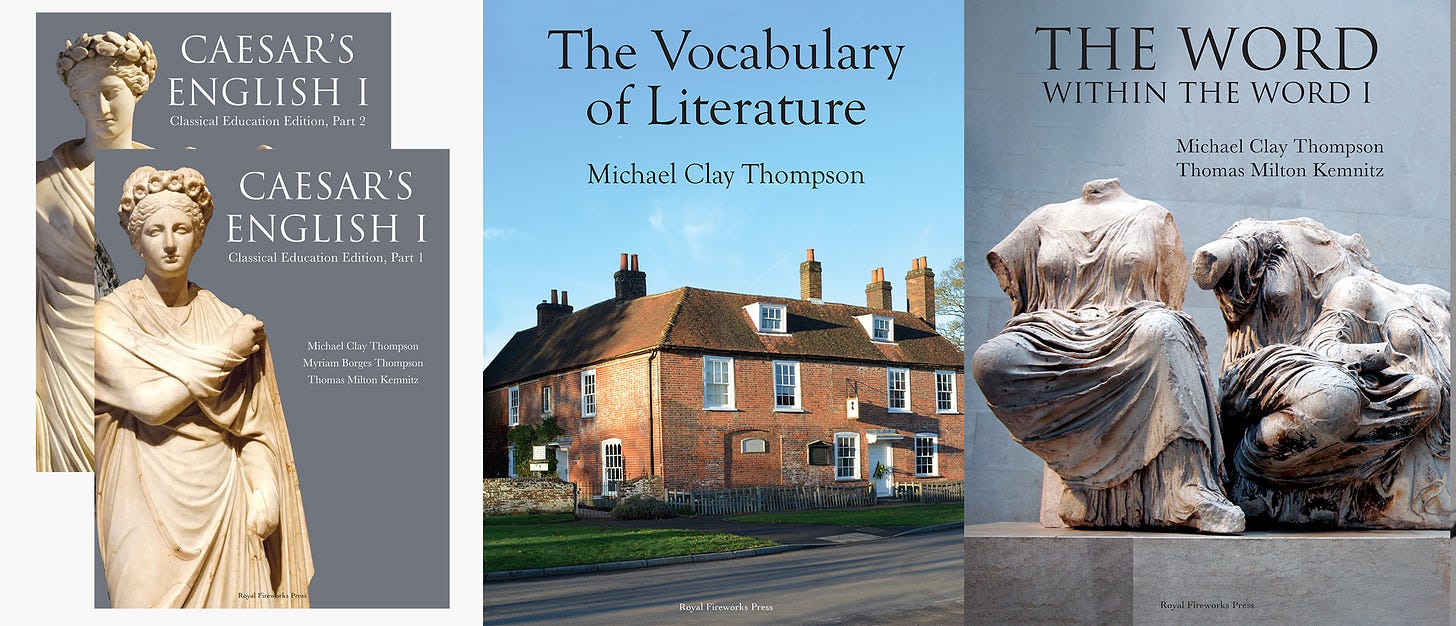
Why Dickens Matters More Than Ever
Whatever the word "great" means, Dickens was what it means.
- G. K. Chesterton
It seems the Head of English at Harris Westminster does not agree with G.K. Chesterton. To my utter astonishment
relates that he stated:“These are not books to ignite a passion for reading. I would happily throw out the study of Dickens from schools”… Talking on the Today programme, Baveystock said that teaching A Christmas Carol as a “little morality tale” for the “four thousandth time” was “putting everyone to sleep.”
An English teacher who expresses such unveiled, cynical loathing of Dickens clearly disdains hopeful stories and has lost the love of his subject. Far from a “little morality tale”, A Christmas Carol offers readers a strikingly current social commentary. Importantly it does not end in despair, but offers a message of redemptive hope. In his most recent post
notes that,“Elevation is our brain’s reaction to moral beauty…Elevation stories, for better or worse, reveal the state of our hearts.”
Dickens is a master of eliciting this sense of elevation from his readers. Only a heart of ice would remain unmoved by this Christmas tale.
“You are fettered," said Scrooge, trembling. "Tell me why?"
"I wear the chain I forged in life," replied the Ghost. "I made it link by link, and yard by yard; I girded it on of my own free will, and of my own free will I wore it.”
― Charles Dickens, A Christmas Carol
Dickens’s depth of understanding of human character, combined with the ability to demonstrate the process of change by reflecting on the past, recognizing the present, and looking ahead to future consequences, is a valuable tool in developing cognitive empathy, a skill that many teenagers, who are particularly prone to self-absorption, struggle with today.
The character of Ebeneezer Scrooge provides a most striking mirror of the misery that is born of social isolation and self-focus. His misanthropic behavior deepened over the years, because he was feeding his greed instead of nurturing his relationships. While we may not be piling our coins, we fall prey to increasing social isolation by focusing our value on status, followers, likes, or other nods of digital approval.
The Act of Reading
Reading any Dickens novel is salubrious for attention spans, language development, and gaining a deeper understanding of human nature. A Christmas Carol is the ideal classic novella to begin retraining our minds to attend to longer stretches of text, because the language is incredibly rich, the story engaging, and the length is not going to do you in. Here a reminder from Rehabilitating Ferals of the Digital Age on why reading longer texts is essential:
With regard to actually training the mind to refocus and develop deep attention, reading books provides the best rehabilitation. This not only for attention’s sake, but because books allow us to dig our minds into the humus of time, people, and civilization as a whole.
Extensive knowledge of books and the wisdom transmitted through the authors behind them expands us into a fuller, more rooted human being. We gain intellectual nourishment, personal insights, and a deeper understanding of the world around us from tasting, eating, and digesting books. In An Experiment in Criticism, C.S. Lewis explains,
“Those of us who have been true readers all our life seldom fully realise the enormous extension of our being which we owe to authors,” ... “We realise it best when we talk with an unliterary friend. He may be full of goodness and good sense but he inhabits a tiny world. In it, we should be suffocated. The man who is contented to be only himself, and therefore less a self, is in prison. My own eyes are not enough for me, I will see through those of others.”
The Repetition
Repetition is a feature not a bug. One of the aspects of digital technology particularly disruptive to depth of thought, emotion, and attention, is that algorithms continuously feed us novel and enticing bits of information that can lead us into terribly dark corners. Yet we grow most deeply not through a continuous stream of new information, but through repetition. Any parent will know the plea of a child to hear a story one more time, again, again, again. Children benefit more from repeated stories than an endless stream of new ones, because understanding moves from plot to deeper appreciation of characters, theme, and underlying motives.
A Christmas Carol has been re-read during the Christmas season countless times. Our family has made it an annual tradition to read the tale, at times just within our own family circle, other times shared with friends to great laughter and acted voices, and most memorably, read out loud by parents with professional sound effects as part of a homeschool Christmas event.
“Reflect upon your present blessings -- of which every man has many -- not on your past misfortunes, of which all men have some.”
- Charles Dickens
Taking it into the World
commented, “The Machine can do its worst. Wherever we are, we have our own work to do, and we might as well do it with good cheer.”Dickens shared a very similar sentiment more than a century ago in a letter to Wilkie Collins “Everything that happens […] shows beyond mistake that you can’t shut out the world; that you are in it, to be of it; that you get yourself into a false position the moment you try to sever yourself from it; that you must mingle with it, and make the best of it, and make the best of yourself into the bargain.”
A Christmas Carol provides a small, but concrete step for introducing good cheer into a dark time, reminding us to reach out to those in need, and turn our hearts outward.
“No one is useless in this world who lightens the burdens of another.”
from Doctor Marigold's Prescriptions by Charles Dickens, 1865
A Christmas Carol - for introverts, ambiverts, and extroverts
“Mankind was my business. The common welfare was my business; charity, mercy, forbearance, benevolence, were all my business. The dealings of my trade were but a drop of water in the comprehensive ocean of my business!”
― Charles Dickens, A Christmas Carol
Between the year 1853 and the year of his death in 1870, Dickens read A Christmas Carol in public 127 times! What follows are some practical suggestions for reading A Christmas Carol the way Dickens intended: in community.
All readings are provided in pdf version, so you do not need to use any screens. Why not be bold and ask participants to power off their phones (or leave them at home)? In smaller circles, you may even wish to read by candlelight. Keeping different personality styles in mind , we have categorized suggestions to be maximally adaptable for introverts, ambiverts, and extroverts.
Introverts
Read an unabridged version of A Christmas Carol (you can download a free pdf I prepared here) or pick a copy up at your local bookstore (used bookstores invariably tend to have copies as well).
Read an abridged version of A Christmas Carol with Dickens’s words only (i.e. no simplified language).
Listen to an audio version of A Christmas Carol condensed by Charles Dickens for his dramatic reading.
Ambiverts
Read an unabridged version of A Christmas Carol together as a family or with a friend over the course of the Advent season.
Assign different roles and read A Christmas Carol for Children to Read out Loud together as a family (the complete reading takes about 45 min.).
Invite some friends or another family to join you in reading A Christmas Carol for Children to Read out Loud over some hot winter drinks and treats.
Attend a public reading of A Christmas Carol. Many churches hold such readings throughout the month of December.
Extroverts
Bring together a small group such as a book club, church group, homeschool co-op, etc. for a reading.
Longer version:
A Christmas Carol Script for Public Readings
Shorter version (approx. 45 min):
If you are particularly energetic and have organizational fervor, put on a public reading of A Christmas Carol. Here are detailed “how-to” instructions for arranging a venue, production planning, advertising and promotion, notes on the script, and reception ideas.
A How To Guide for Organizing Public Readings of "A Christmas Carol”
A Christmas Carol by Charles Dickens - Unabridged
A Christmas Carol for Children to Read out Loud
This abridged version (containing Dickens’s original words only) is perfect for families to read out loud together. It takes about 45 min.
A Christmas Carol: Classic Learner’s Edition
For families and teachers who would like to dig more deeply into A Christmas Carol, I have created a resource that aims to develop a love of classic literature in young readers. Often classics are abridged and whittled down, or otherwise left on the shelf because they are deemed somehow inaccessible. A great part of Dickens’s genius lay in his deeply rich, profoundly true, and often uproariously humorous use of language, and his work is best enjoyed in its original form.
The Classic Learner’s Edition5 enriches reader’s experience by following the unabridged original text and read-aloud version with deep, varied, and entertaining classic vocabulary study. The volume includes:
Classic vocabulary copy work with over 120 words
Truth or malarkey
Vocabulary definition match
Humorous selections
Victorian parlour games
Glossary
You can purchase a paperback version here (in a handy 8.5” by 11” format), but in response to Freddy Baveystock’s cynical comments about A Christmas Carol in the Times, I will offer all resources to download for free. Enjoy!
A Christmas Carol: Classic Vocabulary Study and Copy Work
Truth or Malarkey
Vocabulary Definition Match
Humorous Selections
Victorian Parlour Games
This resouce includes instructions for classic parlour games including Blindman’s Bluff, Lookabout, Pass the Slipper, and more.
A Christmas Carol Glossary
In his biography on Dickens, G. K. Chesterton noted, “…whether the Christmas visions would or would not convert Scrooge, they convert us.” Peco and I agree that the story has profound potential to move us, to help us reexamine our relationships, and to redirect us outward toward others. Importantly, it is not just the story, but also the masterfully crafted language that elevates us.
If you found this post helpful (or hopeful), please consider supporting our work by becoming a paid subscriber, or simply show your appreciation with a like, restack, or share.
We would love to hear from you! Please share your thoughts, reflections, and questions in the comments section.
What are your favorite classics?
How do you approach challenging vocabulary?
What Christmas classics do you or your family enjoy?
Come and join us on A Pilgrimage out of the Machine!
My husband Peco and I will be leading an eleven-day pilgrimage on the Camino in Spain next year, from June 14-24, 2025. Space is limited, so reserve your spot now :) You can read all about it here or view the brochure here. There will be an upcoming Black Friday Special: From midnight Eastern time on Friday, November 29, 2024, until 11:59 PM Eastern time on Sunday, December 1, 2024, any new registrants will receive a $250 discount. We would love for you to join us in visiting historic sites, sharing meals, building relationships, all while hiking through a naturally and spiritually inspiring landscape.
In Feb 2023 Ontario's largest school board voted to drop Shakespeare from the curriculum and install a mandatory Indigenous social studies course instead. The student trustee who spearheaded the removal stated that Shakespeare offers "no relevance in today's society". We are left with students who read novels written in rap and write instagram posts as assignments (I am not kidding).
If you are up for an informative diversion, you can test your English vocabulary here. It takes just a few minutes to complete and provides an estimate of your acquired vocabulary (for English speaking adults between 20’000 and 35’000). It may also lead you to look up what in the world words such as hypnopompic, fuliginous, or tatterdemalion mean.
“The Great Conversation” is the dialectic process of writers and thinkers with works of earlier writers by building on them, alluding to them, or refining them. The Great Books Foundation publishes anthologies ranging from Epic of Gilgamesh to Saul Bellow along with questions designed for lively discussion.
Please note that Amazon has a great variety of books called A Christmas Carol, and some other versions are included in the reviews (this book does not have pop-ups for example). Be sure to select the paperback (not hardcover or kindle) 8.5” by 11” version with ISBN 978-1988604145.






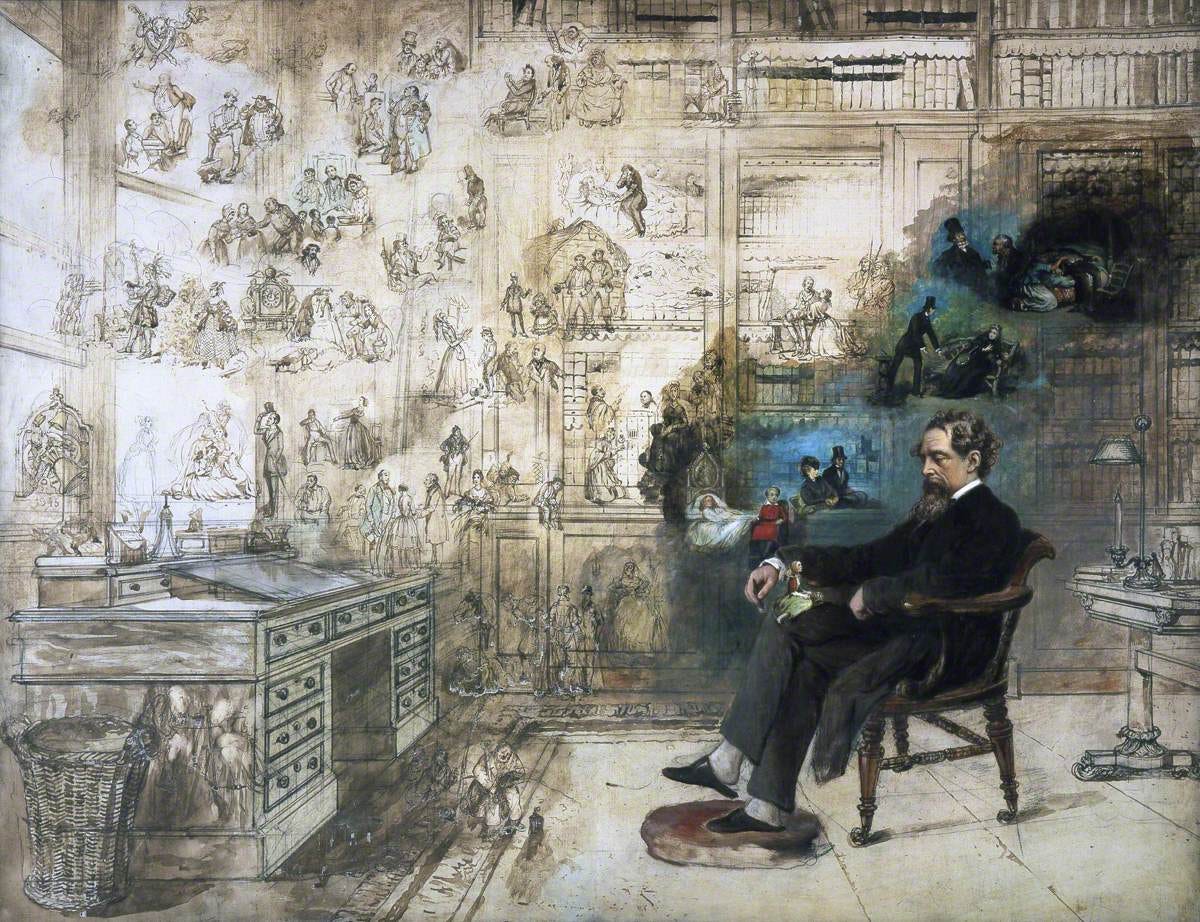
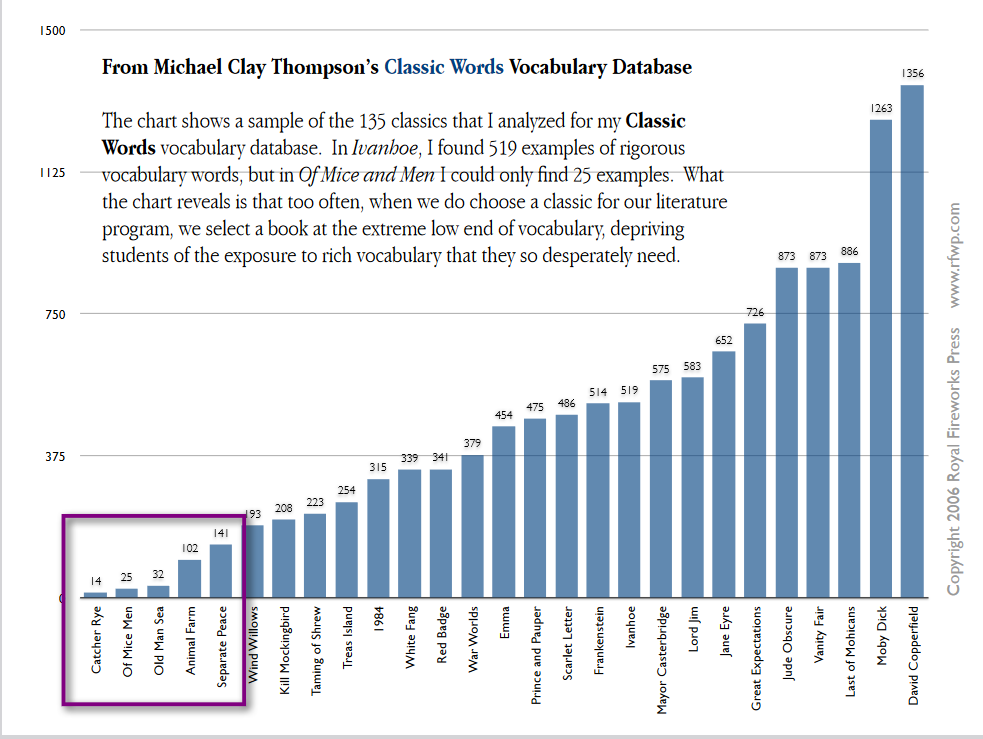
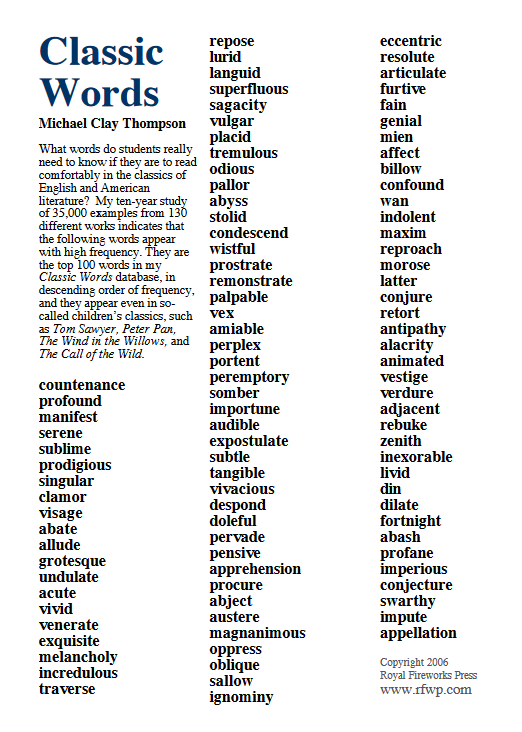
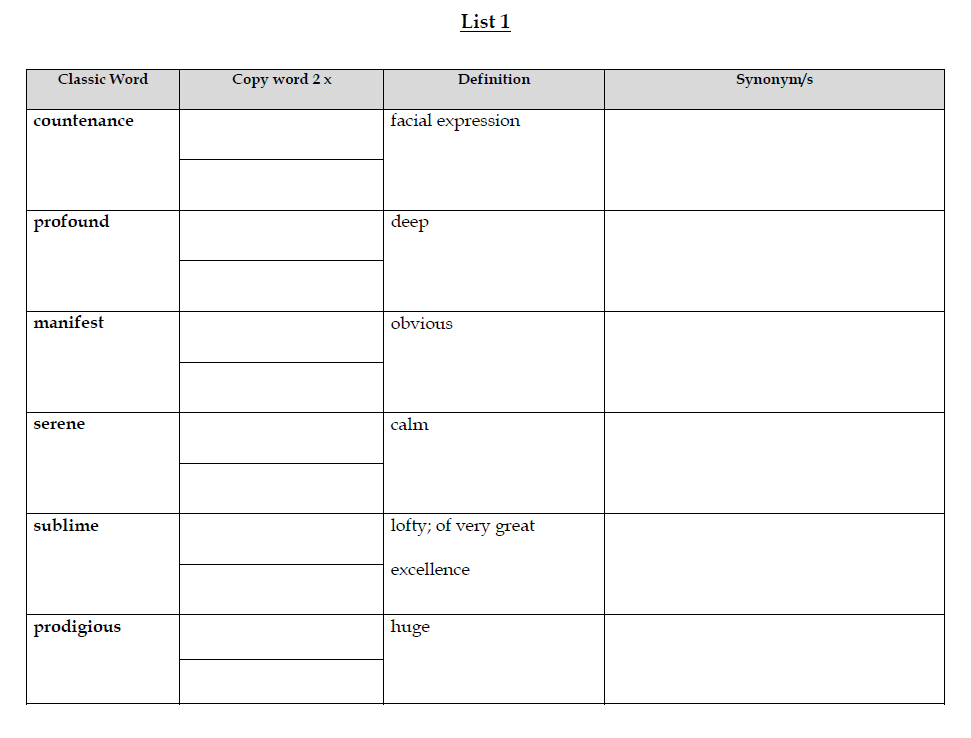
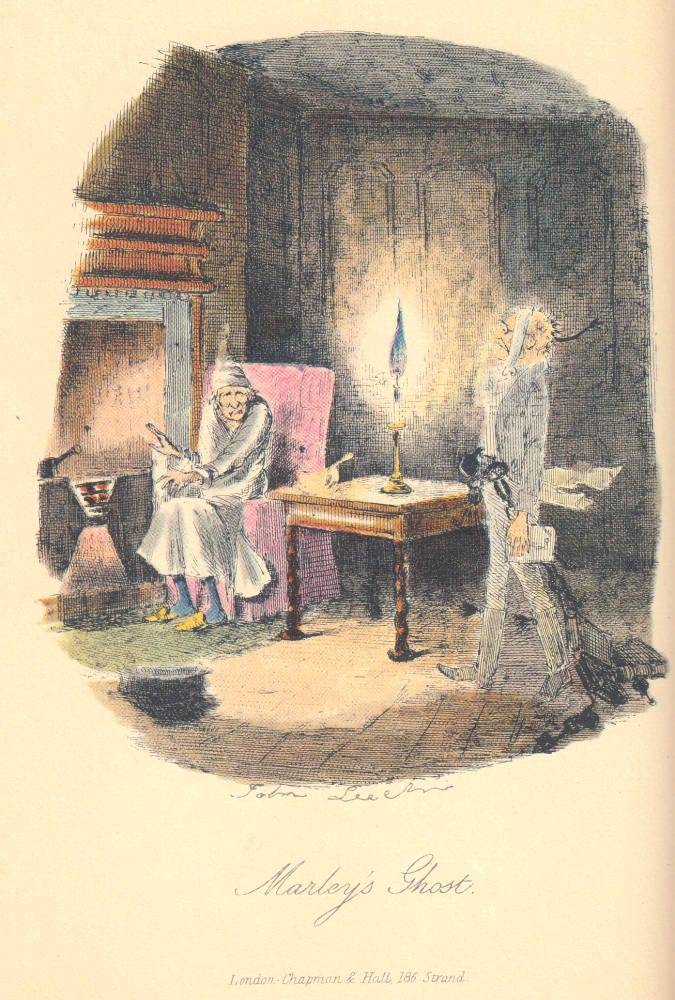

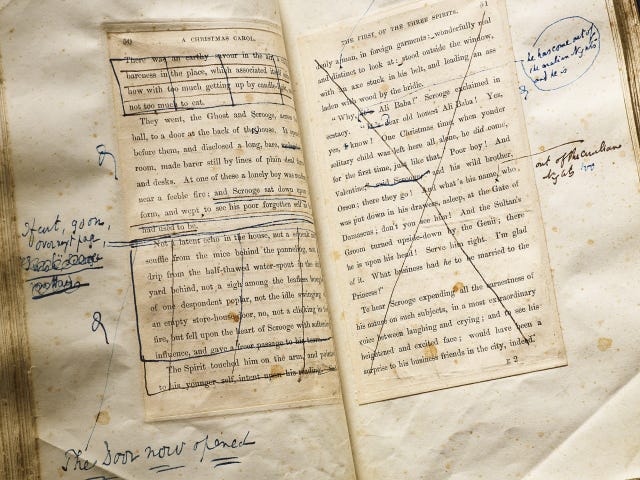


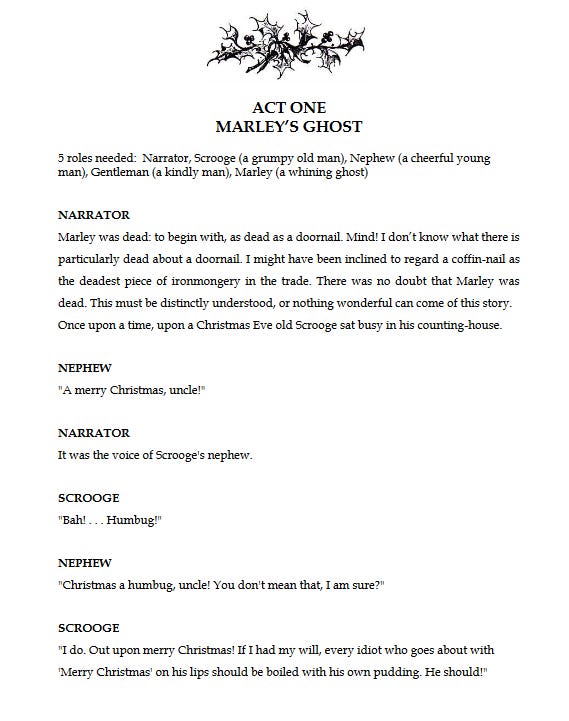
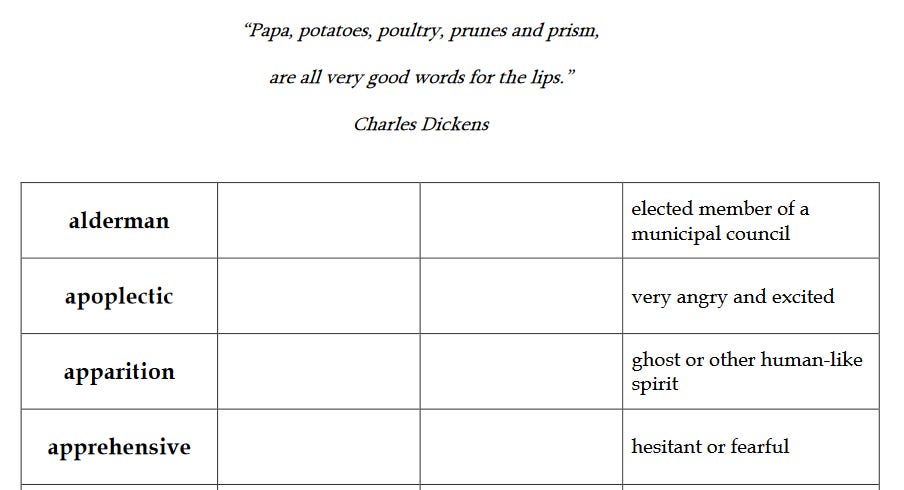
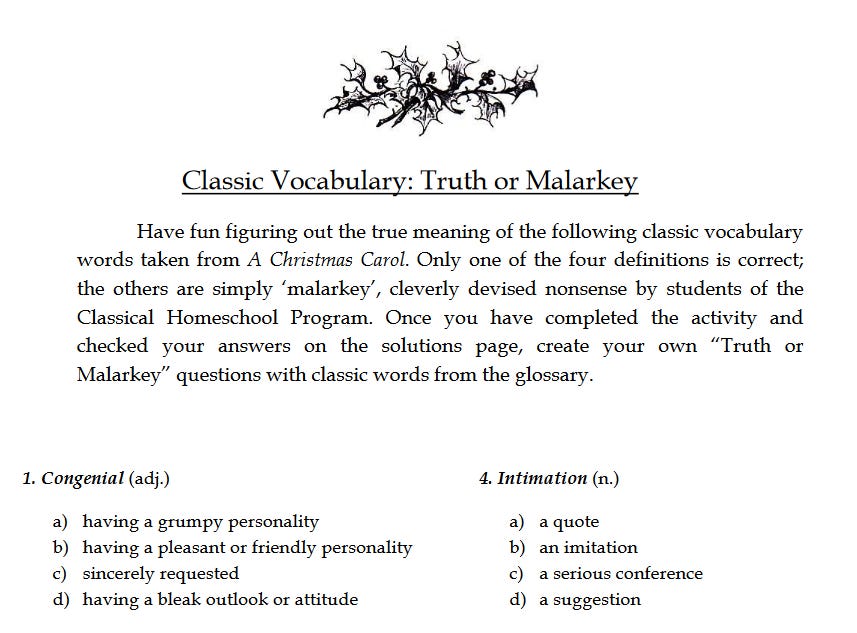
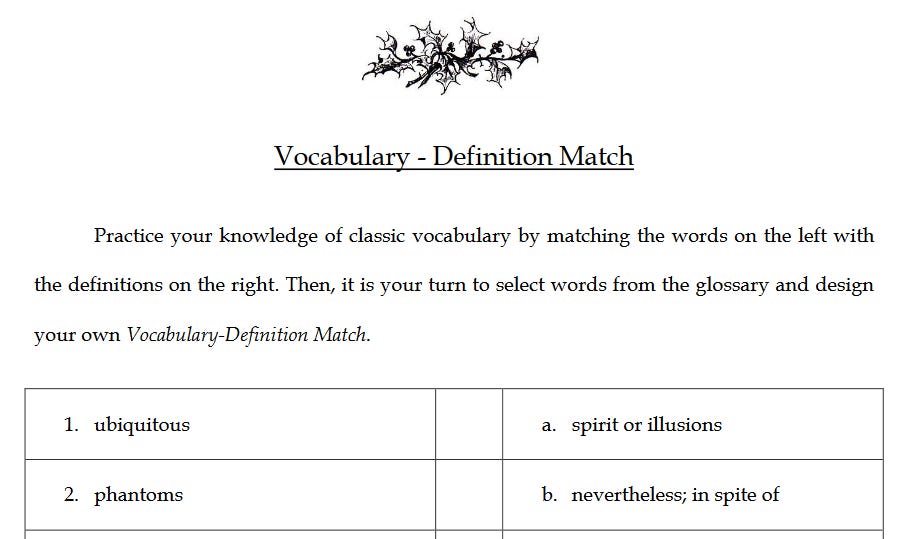
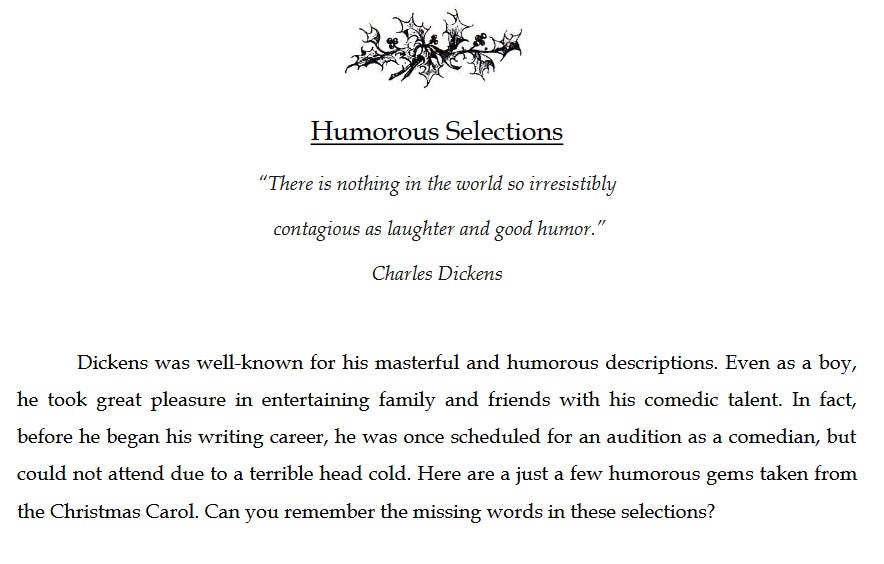
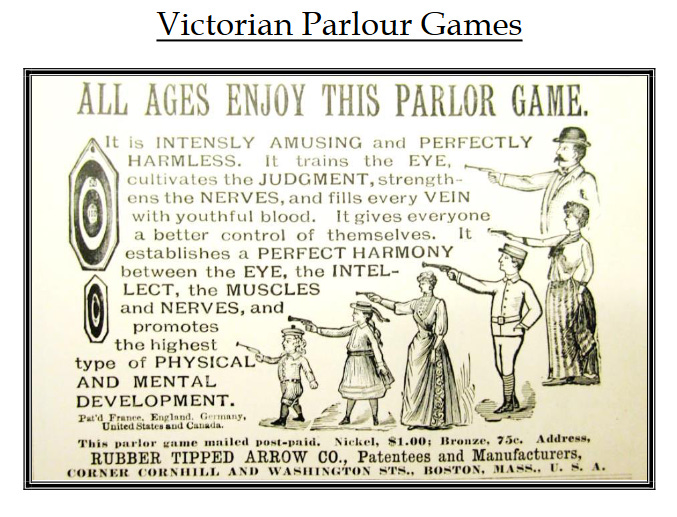
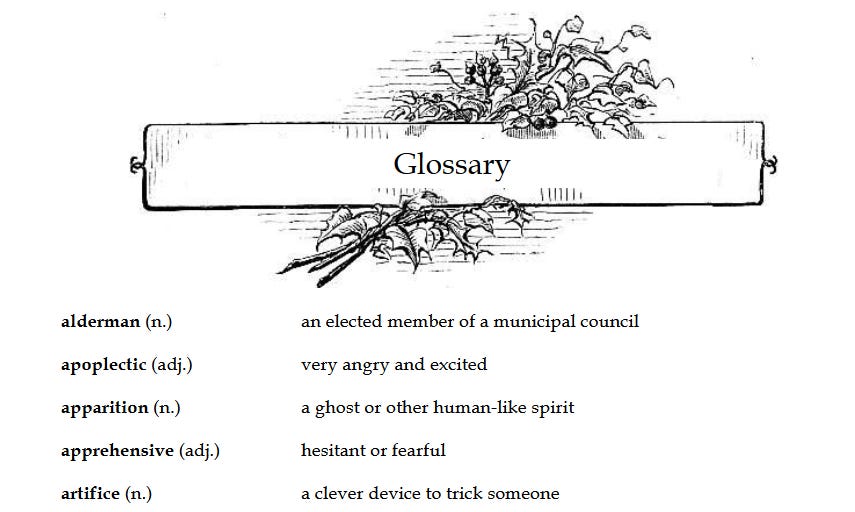
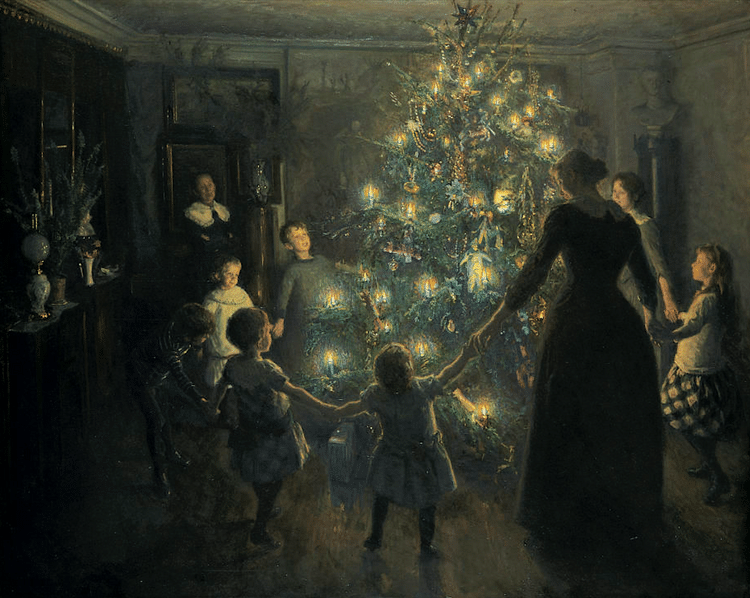
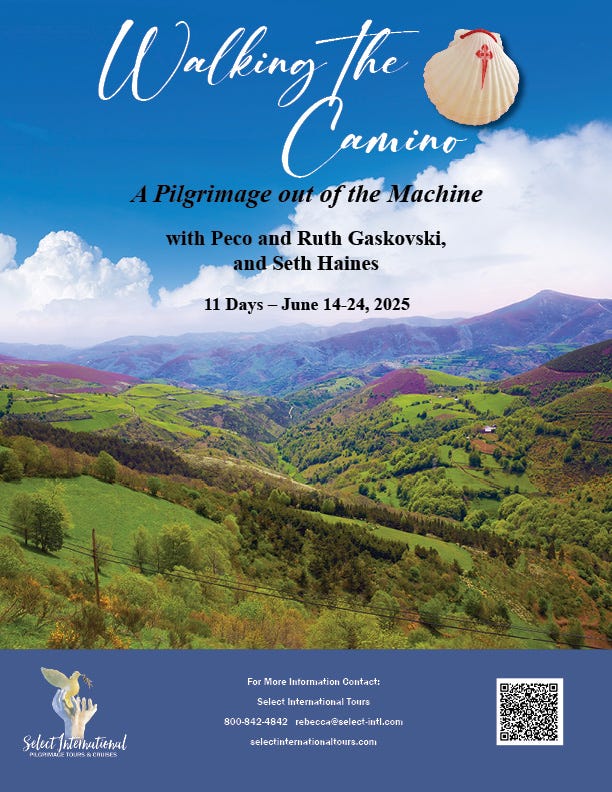
Great resources Ruth, and thanks for the mention. Are you reading War and Peace with our slow read or at your own pace? We start again in January.
On the subject of difficult words and language learning, I think it is important for children and adults to develop reading confidence by picking up books slightly beyond their current comprehension. As a child, I'd read books full of words I didn't understand. It didn't matter as long as I was finding pleasure and satisfaction from the experience. The same was true when I was learning Spanish. Over time, exposure to complex words in their context results in greater comprehension.
So being relaxed about not understanding everything is a great life skill!
Thank you for these wonderful resources, Ruth! I will be using them!